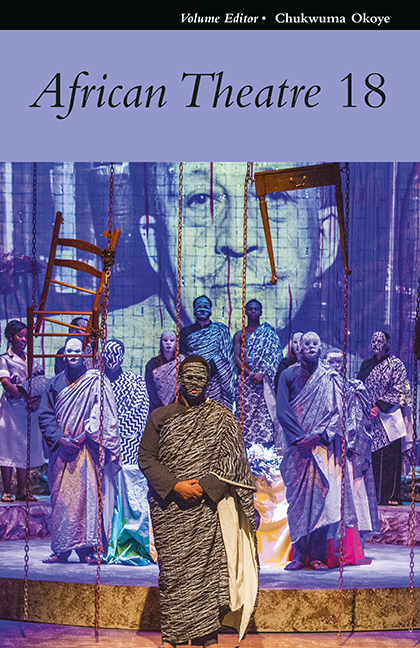Frida M. Mbunda-Nekang, Thorns & Roses: A Play
Published online by Cambridge University Press: 02 April 2020
Summary
The thematic considerations of Thorns and Roses cut across gender dynamics, resilience and contemporary politics in a fictitious African locality. These subjects, which are quite familiar to localities across the globe and which unfortunately have not been totally dismantled, are taken up again by Mbunda-Nekang in her play mainly as a reiteration of morally depraved humans who practise civic responsibility while pretending precepts of good governance.
Divided into four acts, with a plot that frames the issues of governance in contemporary politics and resilience and dynamism of femininity, Thorns and Roses chronicles the life of secondary students Nchindah Noyen, Mnkong Peter, Nene Buji, Yaya, Nchioh and Yune in a coming-of-age narrative, with a hint of romance. The main protagonist of the play is Noyen who in spite of being raised by a strict single mother falls prey to Inspector Jerome's whimsical sexual advances that leave her pregnant (Act 1, Scene 11). Despite the inspector's action being described by the school principal as ‘corruption of innocence’ (28), she is expelled from Kamsi Secondary School, an echo of the kind of betrayal perpetuated by misogyny previously tackled by such playwrights as Werewere Liking in such plays as Singuè Mura: Considèrant que la femme. Commenting on moral corruption, Mbunda-Nekang interrogates the social conceptualization and construction of gender roles engaged by her protagonists in the play:
Nchioh (Interested) Yune, how else can women make it except through hard [work]? We need to work hard to convince our parents who believe that a [woman’s] place is in the kitchen to send more of our sisters to school. (Act 1, Scene 11)
Running concurrently with the gender debates in the play, the playwright creates an administrative and political world that is enveloped by corruption and ethnic bias. Who gains political power and eventually has control over educational infrastructures in a community is a question mooted in Thorns and Roses. The play continues to follow the development of the students who are caught-up in the quagmire of political and ethnic conflicts. The shutting down of the only vocational secondary school in which Noyen finally re-enrols provoke the anger of the Febien, the women's sacred cult which decides to intervene:
Noh Noyen I suggest that the Febien takes a Keng, the peace plant to Mr. Kamsi and [implore] him to do whatever he did to have the school closed down so that the school be reopened.
- Type
- Chapter
- Information
- African Theatre 18 , pp. 197 - 199Publisher: Boydell & BrewerPrint publication year: 2019



